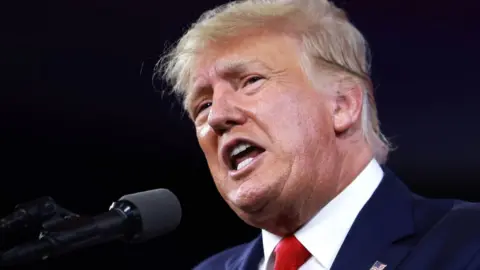Donald Trump's 6 January call logs show seven-hour gap
 Getty Images
Getty ImagesOfficial White House logs from 6 January, 2021 - the day the US Capitol was breached by a mob of Donald Trump's supporters - show a seven hour and 37-minute gap in presidential phone activity while the assault was at its height.
The bipartisan congressional committee investigating the attack had fought a lengthy legal battle to obtain the presidential records, which could shed light on the activity of the president and his closest aides on the day.
The logs show the president contacting at least eight people in the morning - including former White House advisor Steve Bannon and former New York Mayor Rudy Giuliani, who were both organising attempts to overturn Mr Trump's presidential defeat, according to records obtained by CBS News, the BBC's US media partner, and the Washington Post.
It also records calls with 11 people in the evening. But they document no contacts from 11:17 am to 18:45 pm local time (16:17 to 23:45 BST).
This runs counter to accounts from several Republican members of Congress - including House Minority Leader Kevin McCarthy and Senators Mike Lee of Utah and Tommy Tuberville of Alabama - that they spoke with the president by phone that afternoon.
The logs also do not show a reported late morning phone call between Mr Trump and Vice-President Mike Pence, where the latter again refused the president's increasingly angry demands to delay the certification of Joe Biden's presidential victory.
It could be an indication that the president was communicating through unofficial channels, such as an aide's device or an undisclosed "burner" personal mobile phone.
The gap may raise concerns that records of presidential contacts during key moments - as US Capitol police were in a melee with Trump supporters and Secret Service officers were evacuating Mr Pence from the Senate chamber - have been withheld or destroyed. If so, it could prompt accusations of a cover-up reminiscent of the one revealed in the 1973 Watergate investigation, when Oval Office audio recordings provided to congressional investigators contained 18-and-a-half minutes of missing audio.
Accusations of presidential involvement in a criminal conspiracy led to Richard Nixon's resignation the following year.
A Trump representative told the Washington Post that the former president believed all of his phone records had been recorded and preserved.
As the congressional investigation into the 6 January attack approaches its ninth month, a growing number of documents obtained by the committee are finding their way into the public eye.
Last week, text messages from Virginia Thomas to former Trump Chief-of-Staff Mark Meadows revealed the wife of conservative Supreme Court Justice Clarence Thomas was heavily involved in attempts to dispute the 2020 election results and appeared to push related conspiracy theories. The committee is now considering whether to call her to testify.
More documents may be on the way, as a federal judge on Monday ruled that the congressional committee could have access to dozens of emails sent to Mr Trump by John Eastman, a California law professor who was researching ways the then-president could block Mr Biden's victory certification.
The judge, in dismissing Mr Eastman's claims of attorney-client privilege protections in his communications with the president, said it was "more likely than not" that the two men had engaged in a criminal conspiracy to defraud the US by disrupting election certification.
"Their campaign was not confined to the ivory tower — it was a coup in search of a legal theory," he wrote.
The ruling may increase pressure on the Biden Justice Department to advance a criminal case against the former president.
Members of the congressional committee also called on the justice department to prosecute witnesses who were not co-operating with the investigation. So far, the House of Representatives has held two close Trump advisors, Mr Meadows and Mr Bannon, in contempt of Congress for defying committee subpoenas. Only Mr Bannon has faced criminal charges so far, however.
On Monday night, the committee voted to hold two more close Trump associates, communications aide Dan Scavino and trade advisor Peter Navarro, in contempt. Both claim their communications with Mr Trump are protected by presidential privilege - a claim the committee dismisses.
"The Department of Justice has a duty to act on this referral and others that we have sent," Congressman Adam Schiff, a member of the committee, said. "Without enforcement of congressional subpoenas, there is no oversight, and without oversight, no accountability - for the former president, or any other president, past, present, or future."
